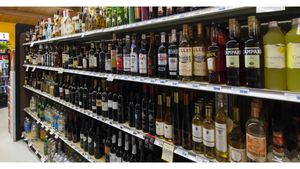The HBC Top 50 2018-01-01 (1)
January 1, 2018
Pain relievers and natural and organic products drive trips to the HBC aisle.
Health and beauty care is one aisle that consumers have always looked to as a solution-oriented section. With products like Advil, Always sanitary napkins, Listerine and Nicorette anti-smoking gum among the top 20 most popular HBC products according to Chicago-based IRI, it is easy to see why consumers associate this aisle with its problem solving capabilities.
The variety of issues that need to be attended to is seemingly endless. Industry observers say that concerns with various types of pain relief are high on consumers’ lists. Dollar sales confirm that—with Advil taking the No. 2 spot in the HBC category overall and Aleve at No. 4—as does category innovation, with various new products devoted to this task being released in the last year.
Gary Pigott, senior vice president of sales and marketing for Miami Lakes, Fla.-based Mason Vitamins, says the market for products geared toward ache-and-pain management will continue to grow. Mason Vitamins recently launched Inflamend, an anti-inflammatory formulation that boasts a more affordable price point than its competition. Because of the product’s lower price point, company officials say it makes a more viable in-store sale than similar products, which are often sold primarily online. Pigott adds that this is helping carve out a new space in grocery stores.
Tooth pain is another reason a consumer may wander down the healthcare aisle. “Sensitive teeth is a very common problem among adults, especially with the jump in popularity of tooth whiteners over the last decade,” says David Fishman, executive vice president of South Fallsburg, N.Y.-based Majestic Drug Co. To combat this issue, Majestic Drug has recently released SenzAway, a tooth desensitizer that works instantly to eliminate tooth sensitivity for at least three months, according to company officials.
Beyond pain relief, natural and organic products are also drawing shoppers into the HBC aisle. These products—lacking chemicals, plastics, dyes and other unnatural ingredients—often provide the solutions consumers are looking for to remedy their health and beauty care issues.
“Whether a Boomer or a Millennial, the vast majority of consumers believe that chemicals are having a negative impact on their personal health and on the health of the planet,” says Karen Page, national sales manager for the Philadelphia-based Penn Herb Co. This negative image that surrounds chemical-laden products is giving better-for-you health and beauty aides room to flourish.
Natural retailers, like Whole Foods and Sprouts, are finding success in the health and beauty aisles thanks to a carefully curated selection of natural solutions and beauty products, observers note. Some even feel that conventional retail chains could take a cue from these specialty stores when crafting their health and beauty sections, by increasing the shelf space fixed for natural and organic products.
This is because more than ever, consumers are concerned about what they are putting in and on their bodies; this goes for everything from skincare to feminine care products to supplements.
“In the coming months and years, you are going to see a lot more buzz about what is in products, and people questioning products that they maybe never thought to question before,” says John Szustaczek, director of sales and marketing for Kitchener, ON, Can.-based Diva Cup.
“We are starting to hear people talking even more about what do these ingredients mean, what are they, which ones are good?” Szustaczek adds. “How do I know that this long ingredient that I can’t pronounce is okay for me?”
This trend has been steadily growing on the food side of the store for years, and is really starting to come up in the health and beauty world as well. Clean labels, pure ingredients and even organic/vegan beauty products are drawing consumers in as they attempt to live the healthiest lives they know how.
“We continue to see consumers move from a historic focus on ‘reactive health’ to one of ‘proactive wellness,’” says Laurie Demeritt, CEO of the Bellevue, Wash.-based Hartman Group. In line with this theory, consumers are seeking out health care sections at groceries and pharmacies for wellness-enhancing products, like supplements. Some top-selling products were Nature Made Mineral Supplements and 1 & 2 Letter Vitamins, up 3.5% and 5.6% in dollar sales, respectively.
“Hot products are those that contain plant-based ingredients in vitamins, supplements,” says Penn Herb’s Page. “Additionally consumers want caps or tablets that are easy to swallow, or gel caps and liquid caps. Plant-based protein products & homeopathic remedies are also hot.”
Many observers expect to see continued growth in the vitamin and supplement section as consumers continue to place a premium on personal health, and do whatever is in their power to keep their bodies in top condition, in the most affordable way possible. “With the insurance situation these days, consumers across the board want better control over their health spend,” adds Page.
About the Author
You May Also Like




